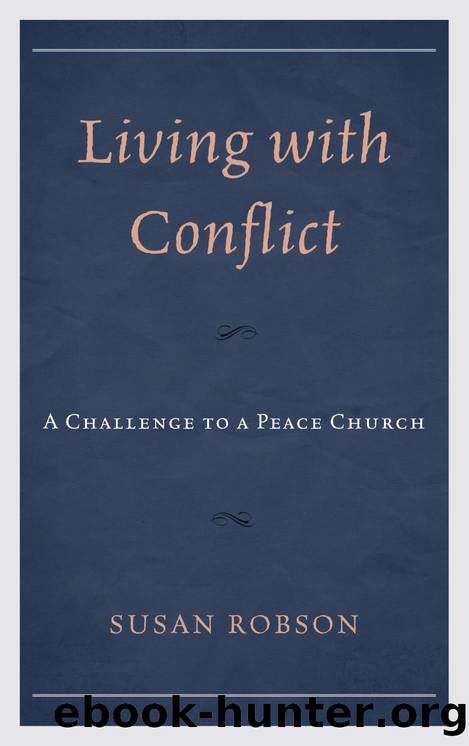Living with Conflict by Robson Susan;

Author:Robson, Susan;
Language: eng
Format: epub
Tags: undefined
Publisher: Scarecrow Press
Published: 2012-08-15T00:00:00+00:00
Leadership
When I attended the Mennonite multidenominational workshop on conflict in congregations,[26] with people from many other church groups, there was one noticeable difference between us. Intractable conflict was well known in most congregations, but when asked to devise a plan for handling it, many of the small groups sooner or later came up with the following suggestion: âask the church leader to sort it out.â This was often accompanied by a laugh or a wry shrug, especially from those who self-identified as church leaders. But as a Quaker, I felt that such a solution was not open to me. There are none who self-identify as leaders among Quakers, and woe betide them if they do.[27] From my interview data, I had gained an impression of constrained and beleaguered Clerks and uncertain and unassertive elders, the most obvious people to be seen as leaders or carrying responsibility.
The Quaker emphasis on equality now results in a rejection of the idea of leadership.[28] I remember ministry in worship from Eveline Cadbury in the 1970s, which expressed the Quaker position. She had been working with Quakers in South Africa under the apartheid regime. When she was picked up by the security police and questioned insistently about the leadership among Quakers, none of her answers satisfied her inquisitors until she found herself driven to say, âWe have no leader; our only leader is Jesus Christ.â In a later contextâa small provincial meeting that had struggled to surviveâshe herself could have been construed as a leader of that group. Her quietly faithful attendance there and willing service over many years had brought her much respect and âweighty Friendâ status[29] but no visible distinction, label, or separation.
Dandelion (1996) came to the conclusion that the idea of a leaderless group was Quaker mythology rather than empirical reality. He found that explicit leadership was shaped by sanctioned and time-limited management roles, which were perceived in terms of responsibility, not influence, and exercised as secular authority. By âsecular authority,â I think he means that a âservant of the meetingâ is governed by the specific demands of the role and cannot be open to the leadings of the spiritââtheir contributions are distinct from ministry.â A Clerk should indeed be careful to appear impartial on issues before the meeting. One interviewee was highly relieved that for the first time in years, she was not serving as a Clerk and could therefore express an opinion in casual conversation and business meeting. But Quaker Faith and Practice 3.12 makes it clear that it is not a secular experience to Clerk a meeting. âIf the clerkâs service is under concern in the certainty of Godâs presence and help in the meeting, then strength beyond her or his normal powers will be given.â
If there are no recognized or designated leaders or if the word leadership is not used, that does not mean that it is not exercised. Even if Clerks, trustees, and employees work within constraints of their roles, they may nevertheless exercise leadership. But the
Download
This site does not store any files on its server. We only index and link to content provided by other sites. Please contact the content providers to delete copyright contents if any and email us, we'll remove relevant links or contents immediately.
| Anglican | Baptist |
| Book of Common Prayer | Calvinist |
| Episcopalian | Inspirational |
| Lutheran | Methodist |
| Pentecostal & Charismatic | Presbyterian |
| Quaker | Seventh-Day Adventist |
| Shaker | Theology |
Angels by Billy Graham(1556)
How To Be Born Again by Billy Graham(1408)
Peace with God by Billy Graham(1321)
Unbroken Curses by Rebecca Brown & Daniel Yoder(1187)
God's Prophetic Symbolism in Everyday Life by Adam Thompson & Adrian Beale(1137)
The School of Biblical Evangelism by Ray Comfort(1102)
Martin Luther: The Man Who Rediscovered God and Changed the World by Eric Metaxas(1095)
Power over the Enemy by John Osteen & Joel Osteen(1079)
Call by Rick Joyner(1061)
Jonathan Edwards: A Life by Marsden George M(956)
The Supernatural Power of a Transformed Mind Expanded Edition: Access to a Life of Miracles by Bill Johnson(950)
Unmasking the Devil: Strategies to Defeat Eternity's Greatest Enemy by John Ramirez(928)
Prayers That Bring Healing and Activate Blessings: Experience the Protection, Power, and Favor of God by John Eckhardt(924)
Fresh Wind, Fresh Fire by Jim Cymbala(917)
An Altar in the World by Barbara Brown Taylor(906)
Reformation Theology by Littlejohn Bradford(890)
Liturgy of the Ordinary by Tish Harrison Warren(882)
Seeing the Voice of God: What God Is Telling You through Dreams and Visions by Smith Laura Harris(876)
Martin Luther by Mansch Larry D.; Peters Curtis H.;(860)
